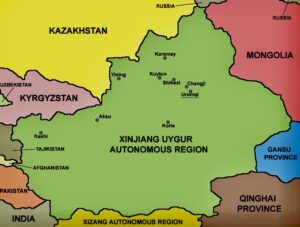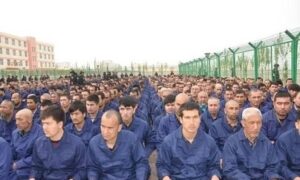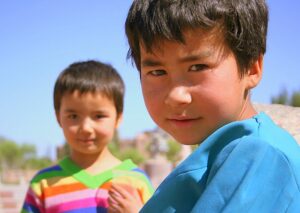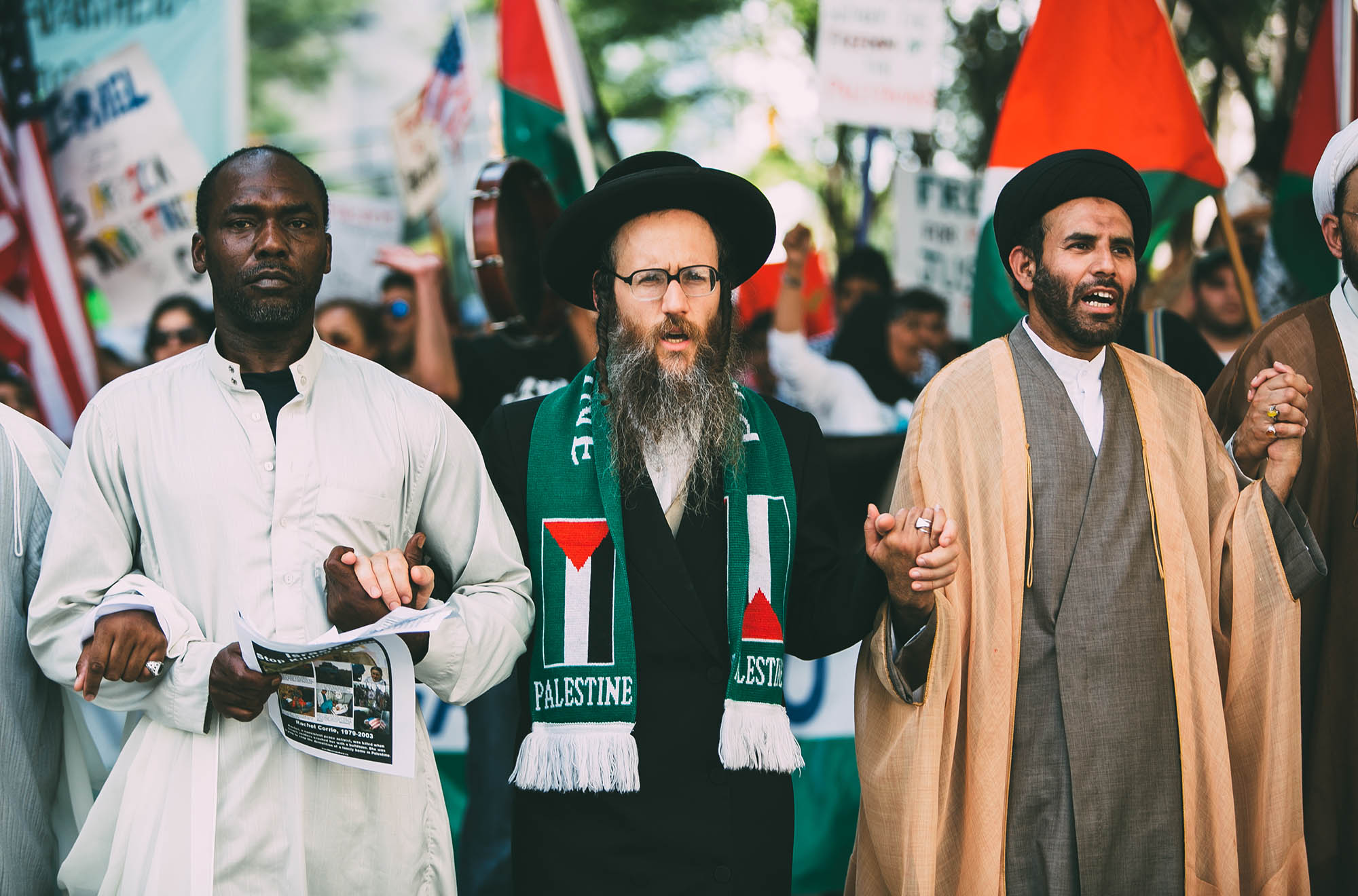Despite its loud denials, China is committing religious genocide against its 10 million Muslim Uighurs. This persecution is horrific in both barbarity and scale. Without our help, the Uighurs will continue to suffer for their faith.
Dr. Warren Larson
The most memorable—and enjoyable—vacation our family has ever taken was in the mid-1980s, when we visited Xinjiang, in the far corner of northwest China. At the time, my wife and I were living in Pakistan, and our two sons in high school. Heading straight north from Islamabad on the Karakorum Highway, along the way, we saw magnificent mountain ranges (Himalaya, Karakoram, Hindukush).

After going through the highest border crossing on earth (Khunjerab Pass over 15,000 feet), we drove another 50 miles inside China, and then were required to travel by taxi. This area was a vast, arid desert and extremely poor, but home to rich minerals, and huge oil deposits. It was amazing to realize that Xinjiang borders eight countries! Arriving in Tashkurgan, a Han Chinese man “offered” to be our guide. Foreigners were obviously being monitored here, but nothing like the scrutiny Muslim minorities are living under today. This article will focus on Uighurs (also spelled “Uyghurs”), the largest of those persecuted groups, responding to questions as to their identity, the extent of their suffering, and what more can be done to help them.
Who are the Uighurs?
Throughout China, there are fifty-six minority groups and ten of these are Muslim, including Hui, Uighur, Kazakh, Kyrgyz, Tajik, Uzbek, and Tartar. Hui is the largest, but as explained below, they have fared much better. Officially, there are over 10 million Uighurs, but this only accounts for one percent of China’s population. They are the oldest known Turkic people, dating back to 8th century Mongols, when some held high positions in the Mongol court. When Islam entered this area in the 10th century, most adopted Sunni Islam, but like other Turkic Muslims, many have been influenced by Sufism.
This means that Uighurs are culturally, religiously, and linguistically more like Central Asians, than Han Chinese. Over the centuries, they have developed a strong identity in oasis towns, and ever since the 1949 Communist takeover of China, have bristled against heavy-handed Beijing rule. They also feel marginalized and shortchanged on the local level, as many Han Chinese have moved into Xinjiang, taken over the best jobs, and are mostly doing well financially. In contrast, Uighurs have often been forced to labor in the textile area, and many are struggling. As a result, they are frustrated and feel they have no future. Hui Muslims slightly outnumber Uighurs, are scattered throughout the entire country, and blend in quite well. They already know Mandarin, understand Confucian culture, and look more Chinese. In short, the government responds to the Uighur and Hui in completely different ways.
What is going on in Xinjiang?[1]
Along with many others, Muslims were oppressed during the Chinese Cultural Revolution (1966-1969), but in the wake of 9-11, Muslims became more suspect. Things came to a boiling point in 2009 as ethnic tensions between Uighurs and Han Chinese escalated. The hot spot was Urumqi, Xinjiang’s capital, where allegedly Uighurs killed 200 Han Chinese. Allegedly, Islamists widely spread this message on social media: “Kill the Han,” “Kill the Hui.” Other Islamist incidents also took place. For example, in June 2012, six Uighurs reportedly tried to hijack a plane but were overpowered by passengers and crew. In 2014, two cars crashed through a market in Urumqi, and explosives were thrown into the crowd. Following these events, if a crime was committed, it was often blamed on Uighurs, said to be barbarians, thieves, and terrorists.
President Xi Jinping, who visited Xinjiang after a Uighur terrorist attack in 2014, told local authorities to respond with “absolutely no mercy.” And that is exactly what happened as China responded to “terrorism, infiltration, and separatism.”[2] In 2016, Party Secretary Chen Quanguo instructed local officials to take harsher measures. In addition to old-fashioned police checkpoints, high-tech facial recognition cameras were installed, and as a result, at least one in ten Uighurs are now held in detention centers; that accounts for over a million people.[3] In these centers, verbal, physical, and even sexual abuse is the norm. There is political indoctrination and detainees are forced to learn Mandarin. They must sing hymns of praise for the Communist party and write self-critical essays.
Uighurs suffer barbaric religious oppression

There has also been an increase in religious oppression against the Uighurs. Thousands of mosques have been destroyed as well as some shrines. Anything perceived as Islamic: beards, veils, books, fasting, prayer rugs, and pilgrimage to Mecca (hajj) are prohibited. Uighurs may even be detained for giving up smoking or drinking because it is seen as a sign of religious devotion. Uighurs are therefore condemned for being Muslim; in fact, any expression of Islam, when it comes to Uighurs, is considered a form of terrorism.[4]
The degree to which artificial intelligence is used to suppress Uighurs makes Xinjiang the most highly monitored place on earth. Cameras have been even been installed in some homes. There is forced sterilization, mandatory birth control (IUDs), and forced abortion. Women have been detained for their husband’s crimes. Children have been separated from their parents and placed in orphanages to be indoctrinated. These are called “re-education camps,” but the world knows better.[5]

It is common knowledge that for years China has been lying about what really goes on inside Xingjian’s “vocational education and training centres,” but who could imagine what was being done to Uighur women? “… Rape has become a culture. It is gang rape and the Chinese police not only rape them but also electrocute them. They are subject to horrific torture …” One public gang rape of a young woman took place in front of about 100 other detainees in order to force a confession. Police took turns raping her, and as the young woman cried out for help, onlookers were carefully observed. If they showed any sign of resistance on surveillance cameras, they were spotted and picked out for punishment.[6]
Another escapee said, “They not only rape but also bite all over your body, you don’t know if they are human or animal … they didn’t spare any part of the body …” “… One girl became completely different after that [rape and torture], she wouldn’t speak to anyone, she sat quietly staring off into space.” Later, that same woman was released and became “like someone who simply existed, otherwise she was dead, completely finished by the rapes … they say people are released, but in my opinion everyone who leaves the camps is finished.” The article ends by saying that is the plan: “Their goal is to destroy everyone … And everybody knows it.”[7]
How is China responding to criticism?
At first, China denied the detention camps and later claimed it was simply weeding out extremism and preventing terrorist attacks. There is no abuse, China says, but only training centers that provide job skills. It steadfastly denies singling out any one group but is only acting for the purpose of “rehabilitation and reintegration.” It is a matter of correcting “wrong thinking,” and they use words like “love,” “nurture,” “kindness,” and speak of “Little Angel Schools,” in reference to children. The truth is China is engineering the minds of Uighurs and claiming they are working for “better life habits.” It is “Sinicization,” the process of making people conform to the majority Han Chinese in matters like culture, language, social norms, and ethnic identity. There is to be complete conformity with Communist ideology.
Some question whether or not what is going on is physical genocide, however, forced sterilization, involuntary contraception, and systematic suppression of birth rate certainly say it is. Genocide is defined as killing a large number of people from a particular nation or ethnic group. In Xinjiang, there is a deliberate attempt to diminish Uighurs, and estimates are that the population growth rate among the Uighurs decreased 60 percent from 2015-2018. This paper suggests that what is going on in Xinjiang is both cultural and physical genocide.[8]
How can we help the Uighurs?
The first thing is that we must speak up in defence of persecuted Muslims. This is more urgent since Uighur leaders fear the worse is yet to come, and Hui Muslims inside the country are also afraid of persecution. Unfortunately, Muslim majority countries have largely remained silent.[9] Therefore, we must keep speaking and encourage others to do the same.[10]

Another suggestion is to hold fashion brands accountable and stop importing them. Any brand of cotton from this part of the world is likely produced by Uighur forced labor, many of them well-known brands. This unethical practice will doubtless continue until something is done, and the international community must think harder about how to stop it.
Finally, we can be on the outlook for Uighurs, who live around us in the West. We can discreetly do our best to befriend them, reach out with a helping hand, and stand up for them in every way possible. There is no doubt that Uighurs in exile face harassment and intimidation if they speak up because they know China is keeping tabs on them. We cannot allow this mass, systematic campaign of human rights abuse to continue. In facing the horror of the Holocaust against Jews in Germany, Dietrich Bonhoeffer said, “Silence in the face of evil is evil itself. Not to speak is to speak. Not to act is to act.”
[1] Numerous reports have surfaced through HRW (Human Rights Watch), UN reports, satellite pictures and from the testimonies of escapees. Also, the Intelligence Consortium of Investigative Journalists: “China Cables: ‘Who are the Uighurs and Why Mass Detention?”
[2] Since Xinjiang is home to gas and oil reserves, China wants to rule out any hint of separatism.
[3] That may be a conservative figure, as others estimate well over 2 million are being held in detention camps.
[4] This is similar to how some early Christians were treated. When describing how unfair and unjust persecution could be in the Roman Empire, writing in the 2nd century, Tertullian says believers were often counted criminals simply because they were Christian (The Apology, Beloved Publishing, 2014, p. 71).
[5] BuzzFeed News has taken hundreds of satellite images and says these large facilities in China look like prisons.
[6] ‘Their goal is to destroy everyone’: Uighur Camp detainees allege systematic rape.
[7] Ibid.
[8] The UN has been saying for some time that what China is doing is genocide. For example, “China’s Suppression of Uighur Muslims Meets UN Definition of Genocide”
[9] The United States has provided the most forceful response, announcing sanctions in October against Chinese entities and officials linked to repression in Xinjiang. https://www.icij.org/investigations/china-cables/china-cables-who-are-the-uighurs-and-why-mass-detention/. Also, in 2020 Germany led a group of 38 other countries in making a joint statement of condemnation to the UN over China’s abuse of its Uighurs. Besides a number of other EU states, the United States, Canada, the UK, Japan and Australia joined in Germany’s condemnation. Djibouti and Bosnia and Herzegovina were the only Muslim countries that signed the statement. “39 Countries condemn China over policies in Xinjiang, Hong Kong.” See also: https://thediplomat.com/2020/10/2020-edition-which-countries-are-for-or-against-chinas-xinjiang-policies/ In 2020, 45 countries signed a joint statement firmly supporting China’s treatment of its Uighurs. A number of Muslim majority countries signed it, including Saudi Arabia, Egypt, Iran, Iraq, Pakistan, Eritrea, Palestine, Sudan, Syria, UAE, Morocco and Yemen. https://www.axios.com/un-statement-china-uighurs-xinjiang-6b29dbf5-b93c-4c70-bd4c-333e1c23471f.html
[10] Some former students from China seem dismissive of the above, presumably for fear of reprisals, because they too are being watched.




A couple of Canadian newspaper articles say western nations are taking a united front against China regarding the Uighurs, and that’s encouraging
https://www.cbc.ca/news/politics/china-responsible-genocide-independent-report-1.5942289
https://www.cbc.ca/news/politics/canada-china-sanctions-xinjiang-1.5959080